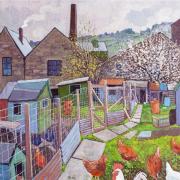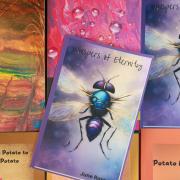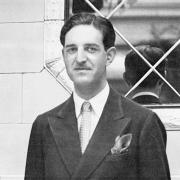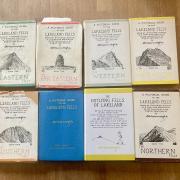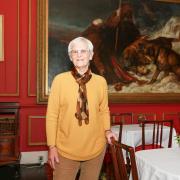It’s hard to tell which are the hardier in winter - the farmers or the sheep. Writer and photographer Irene Amiet went to find out

The lonk sheep add commercial significance to the pastoral landscape on Pendle’s western fell, as their steaming breath rises into a clear sky on this winter’s day near Clitheroe. These animals are Lancashire born and bred. Their owners, James and Robert Whitwell, are as well.
Together, they farm a tenancy of 650 acres. Their family has bred sheep on the same land at Pendleton for over 100 years. Their business is called T. Whitwell & Sons, after their grandfather Thomas. Robert Whitwell, the current tenant, scans the fields framing a small lane leading to the hamlet of Mearley, where something like 1,000 sheep graze, scattered from the edge of Clitheroe to the steep fellside of Pendle. The Whitwell’s pure-bred lonk stock herd is about 500 animals strong. All other sheep are mules, bred for the natural sturdiness that comes with gene diversification.
Farming is in the Whitwell’s blood, as is the breeding of their lonks. Asked why this specific breed, James Whitwell, Robert’s brother and business partner, shrugs. ‘There’s always been lonks on this land. My dad, my granddad, they all kept lonks. It’s what we do.’
The Whitwells certainly do it well. Two years in a row one of their lonk tups won Best in Show at the Clitheroe auction.

According to many breeders, lonks are not the easiest sheep to keep. For a start, they aren’t the nimblest. ‘The lonks are a smart breed,’ Robert says. ‘Too smart maybe, as they escape easily and then teach their young.’ It’s up to anyone’s interpretation if his lopsided smile reflects admiration for their resourcefulness or curses the brains they might have.
What the sheep do have is a magnificent set of curly horns and a distinctive black and white head pattern. Their meat must be tasty too, as the gourmet restaurant Northcote in Langho has had a lonk dish on their menu in recent years.
Robert and James know within a couple of weeks of lambing which animals they’ll keep for breeding, and which will be taken to auction. Asked if they had favourites James says: ‘Why, naturally. They have to stand on four good legs, with straight feet, wool not too tight and not too loose, no black hair in the white spots, and just a bit of style, a bit of panache.’
Over generations, the Whitwells have picked the right animals to give their herd the specifics they require, be it in build or colour.

Asked if they ever considered another profession, both Whitwell brothers shake their heads. ‘No, it is who we are,’ James says. ‘It was expected of us.’ He admits it’s a lifestyle that completely dominates their year and, even when away, he’s still thinking about the farm. ‘Even Christmas dinner is fitted in around all the animals’ needs.’
At least Robert and James have a great support network as their father was one of eight kids, six of them boys. All became farmers so there’s always a lot of help in form of cousins and uncles, when they need it.
Robert’s wife, Pamela, a police officer, took a career break a year ago to help her husband on the farm. She is learning as she goes, but one of their sheepdogs, Jess, is definitely more her dog than anyone else’s.
Robert thinks she treats Jess too much like a pet, but Pamela shrugs this off with a wink, before the dog jumps on the back of her quadbike, tongue lolling, eying a bachelor herd of tups. Pamela also has a soft heart for the stray cats that have made their barn a home.

Robert remembers winters past, when their farms had been snowed in and they had to try and check the sheep through four feet of snow. The last year have brought more rain, however. Winter 2015, when many areas suffered from flooding, Pamela found the barn under water and a cat sailing past marooned on a floating bale of hay.
Jolie Whitwell, who is married to James, has to keep her eyes on their three kids, the youngest of whom, eighteen-month old Chloe, traipses after her brothers towards the barn, in search of adventure.
Jolie recalls that when they first got together, James taught her to drive a quad and the tractor. Now she enjoys feeding the livestock with the kids. Six-year-old Jack knows what he aims to be. ‘A farmer. Like daddy,’ he proclaims while taking a secure stance next to a row of calves. Jack’s brother William eyes the animals with a humorous twinkle. ‘They’re nice, all right. And mucky.’ He proceeds to find a barn-cat to cuddle.
Jolie recounts Jack’s tears during shearing time, when 900 of their animals were relieved of their thick, woolly coats. He had to go to school instead of helping.

Christmas has always meant an opportunity for Jack to add to the toy farm that has taken over his room at their home. In previous years, when his father and uncle marked their sheep with colours in the pen outside, he was busy using stamps to mark his toy sheep.
Inside the barn, opened hay-bales exude a gift of preserved summer on this cold winter’s day, reminding Jolie of warmer weather, when the family works all hours of daylight to get the hay in.
Being a newcomer to farming, she particularly enjoys the times when the family gets to spend working days together in the field, and she can take a picnic out to share.
Asked what he enjoys and fears most about his life’s work, James’s lips press together. ‘Being outdoors is great. But the weather will always be boss.’

Jolie laughs. ‘I can hear James cursing across the yard when the weather changes for worse.’ Adds James: ‘Or when a sheep escapes.’
Ewes in the news
Lonk sheep have been on our uplands since ancient times and the name is thought to derive from ‘lanky’ – the Lancashire word for long and thin.

The monks at Whalley and Sawley are thought to have farmed them and while they are native to Lancashire, a few strayed into the Peak District and a smattering took a wrong turn and ended up in Yorkshire.
They live in Lancashire’s high places with a minimum of fuss, grazing in the sort of spots where most other breeds wouldn’t be seen dead.
They came to the nation’s attention a few years back when Michelin-starred Northcote chef Nigel Haworth used Lonk to cook a stunning hotpot which saw him win the main prize on BBC2s The Great British Menu.




